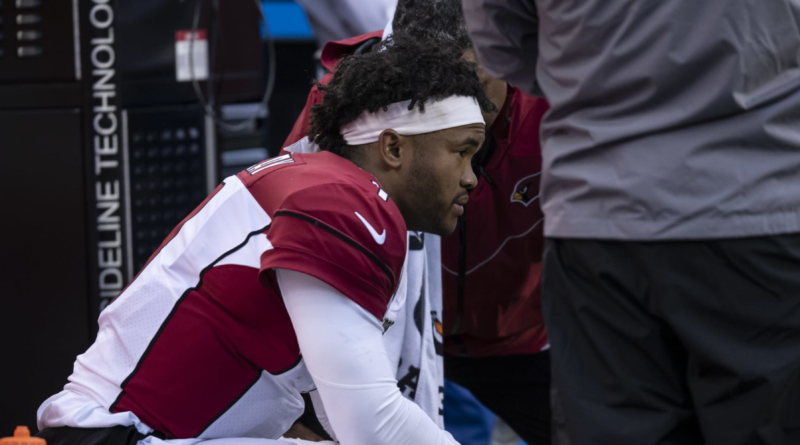Kyler Murray's New Homework Clause and Other Strange NFL Contract Stipulations – Bleacher Report
Kyler Murray made headlines last week not only for the massive five-year, $230.5 million contract extension he signed with the Arizona Cardinals but also for a unique homework clause put in that new deal.
According to Mike Florio of Pro Football Talk, the contract stipulates that the quarterback must engage in at least four hours of “Independent Study” per week during the NFL season.
The contract goes on to define “Independent Study” as material provided by the Cardinals to help them prepare for an upcoming game, and the time must be earned outside of mandatory meetings.
It even has language disallowing Murray from engaging in other distractions during these study hours, citing video games and browsing the internet as some of the activities that would disqualify him from getting credit.
An anonymous front-office executive told Yahoo Sports’ Charles Robinson that he thinks the clause could undermine the quarterback:
“If it’s the kind of problem that needs to be addressed [in the deal], then maybe you should rethink whether you want to do [the deal] at all. Or figure another way to do this that doesn’t make everyone think — justified or not — that you have a guy with issues dedicating to a level you need.
[…]
“You put the language in there and you know it’s going to be a story forever. And it will be, too.”
This is certainly a strange clause, but it’s far from the only weird contract stipulation to have come to light.
With that in mind, here’s a look at some of the most bizarre or unique clauses in NFL contracts over the years.
Cincinnati Bengals Rookie Contracts Enforce Loyalty
The Cincinnati Bengals have long been protective of their team’s image.
The club even went as far as putting loyalty stipulations in their rookie contracts starting back in 2000 to help prevent criticism of the organization. Players who made critical remarks about the team could be forced to forfeit their signing bonus with this clause active.
The so-called “Pickens Clause” is named after former Cincinnati wideout Carl Pickens, who publicly attacked the franchise to the chagrin of owner Mike Brown.
Len Pasquarelli, formerly of ESPN, found that the NFLPA had challenged the loyalty clause, but an arbitrator ruled it could be included if agreed upon by the player.
Weight Clauses Have Provided Motivation to Stay in Shape
Eddie Lacy drew criticism during his playing days for his perceived lack of conditioning. The former Green Bay Packers and Seattle Seahawks running back struggled with his weight to the point that Seattle implemented conditioning bonuses into his contract.
ESPN’s Field Yates tweeted in March 2017 that the running back would get $55,000 for reaching a target weight each month during the upcoming campaign.
Lacy isn’t the only player to have had weight incentives in his contract.
Trent Brown was the NFL’s heaviest player last year. According to ESPN’s Mike Reiss, the New England Patriots want the 6’8″ Brown to play at 365 pounds rather than his listed 380. His new two-year contract includes $750,000 weight bonuses for 2022 and 2023, with milestones for trimming down leading up to the season and maintaining an ideal weight each week.
Brown will make $150,000 if he shows up at 380 pounds or less to start offseason activities, another $75,000 if he’s down to at least 375 on June 1, another $75,000 if he’s down to at least 365 on July 15 and an additional $25,000 for each week that he tips the scales at 365 or less during the regular season.
Rick Mirer Would Still Have Gotten Paid If the World Ended
After a standout collegiate career at Notre Dame, Rick Mirer entered the NFL as the No. 2 overall pick in the 1993 draft.
It was an uncertain time for prospects who were signing their first contracts, given the league was preparing to begin the salary-cap era in 1994. Mirer’s agents, Marvin Demoff and Don Yee, opted to insert one of the most unique clauses in NFL contract history to ensure their client got paid.
According to ESPN’s Kevin Seifert, Mirer’s contract took a page from the banking industry by noting the deal would “survive and remain effective from the date of execution of this contract up to and including the end of the world.”
While the league ultimately banned that phrasing in future deals, Mirer’s unique clause stuck.
When Seattle Seahawks teammate Jeff Graham asked if the quarterback would still get paid if he were in a space shuttle and the world exploded beneath him, Mirer quipped, “I keep the shuttle.”
D’Brickashaw Ferguson Needed to Block Seven Kicks to Get His Money
The New York Jets got creative when it came to paying D’Brickashaw Ferguson in 2010.
The offensive tackle signed a deal that was technically worth $60 million over six years, but the reality was that Ferguson was never going to be able to earn that much.
According to Gregg Rosenthal for Pro Football Talk, the offensive lineman had $1.3 million in incentives tied to special teams play during the 2015 and 2016 seasons.
Ferguson would have to play 97 percent of the special teams snaps and block an absurd seven punts in each of those campaigns to get that cash. The most ever blocked in a single season was (and still is) six. Harry Newsome did so in 1988.
Ferguson, who hasn’t played an NFL snap since retiring following the 2015 campaign, only saw 77 special teams snaps (16 percent) during his final year in the league.
The latest in the sports world, emailed daily.
The latest in the sports world, emailed daily.



